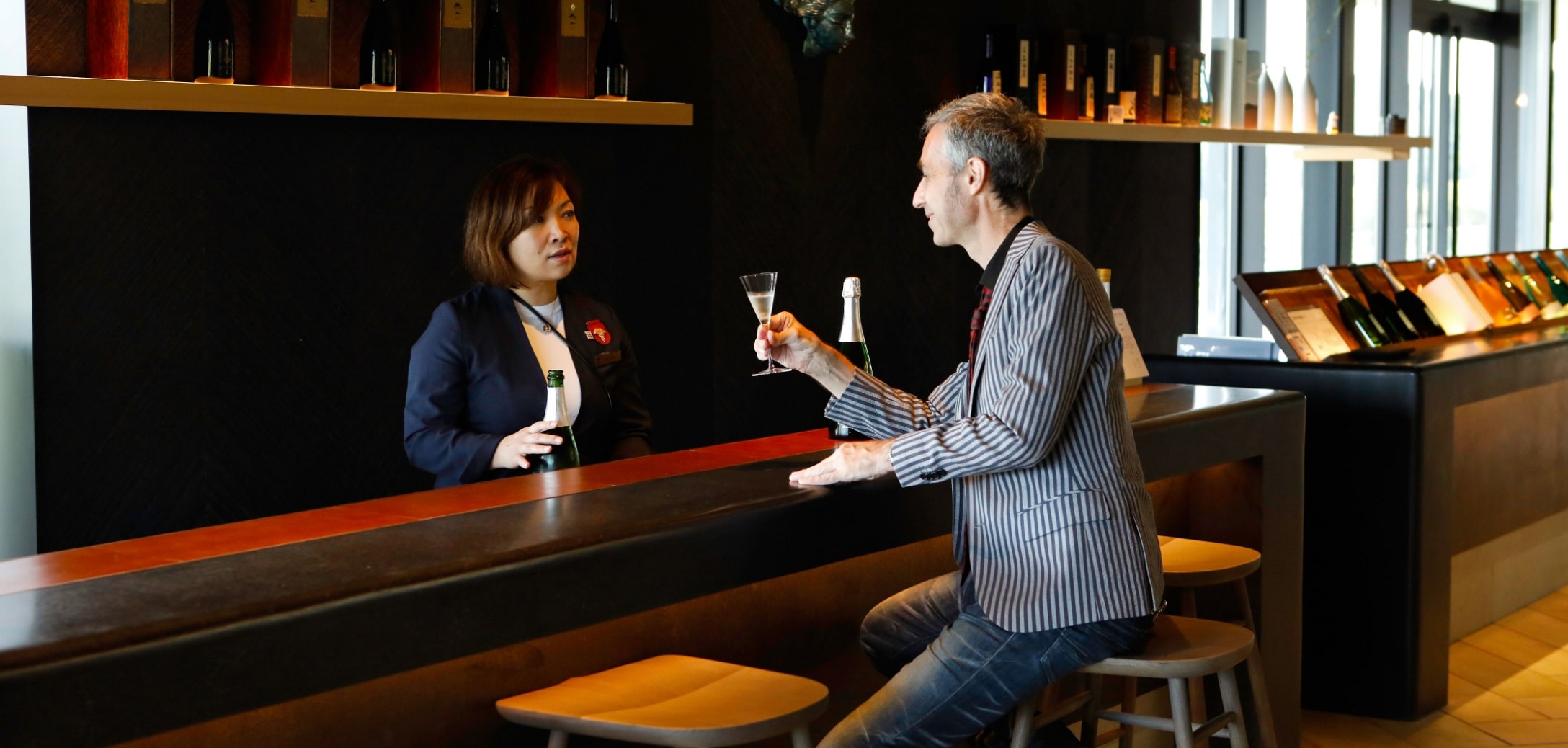Stop and pause in Fukui. Meditate on the meaning of life in an ancient temple, and then enjoy the Great Things life has to offer in a new relaxation facility showcasing traditional Fukui products, food and saké.
Daianzen-ji Temple - Architecture, Zazen, Gardens …and Secrets-
The Daianzen-ji Temple, a Rinzai sect Buddhist monastery located in Fukui Prefecture’s Tanotani-cho, was established in 1658 by Matsudaira Mitsumichi, the 4th Lord of the Fukui Matsudaira clan, as the family temple. As such, the temple houses the Kaiki Byousho pavilion where the spirits of the Matsudaira are enshrined, and the graves of the local warlords themselves stand at attention on the hilltop overlooking the area. In fact, the Daianzen-ji Temple was more than just the spiritual retreat of the feudal Matsudaira clan lords, it was designed and constructed as a secret hidden castle! The river below the mountain formed a natural moat, the once walled temple’s Sanmon gate is of a style developed particularly for castles, while the great belfry could be turned instantly into a defensive yagura watchtower. If Fukui Castle was ever attacked, the Matsudaira clan could flee to the safety of the fortified Daianzen-ji.

One rank below National Treasure status, the Important Cultural Property designated temple’s ancient architecture of the main prayer hall is currently undergoing major restoration, and is expected to be completed around 2032. Even so, visitors are welcome to come and inspect the traditional craftsmen’s authentic restoration work, and to enjoy the temples’ famed seasonal flower gardens. Many hundreds of hydrangeas bloom in May, Japanese irises can be enjoyed in June, and roses draw crowds during the warmer months.
Daianzen-ji also offers shakyo, a meditative practice where one relaxes while committed to concentrating on tracing sutras using a traditional brush and ink. Similarly, shabutsu in which Buddhist imagery is traced, and the art of kirie, paper cutting techniques used to make Buddhist-themed imagery, are all available by reservation. Visitors can also make advance reservations to enjoy a meal of traditional Buddhist shojin ryori, vegetarian cuisine.


Many visitors come to see the graves of the Lords of Fukui, yet many more come to experience the benefits of authentic, traditional Zazen, one of the major drawcards and specialties of the Daianzen-ji Temple.
The head priest of the Daianzen-ji, Mr. Takahashi Genpou explained that, “Zazen is not a religious experience, it involves you and your inner feelings, and so anyone is welcome to try, regardless of your beliefs. Just don’t expect miracles, instant answers, or life changing experiences from a single experience of the practicing Zazen.” “Things don’t change,” he said cryptically with a smile, “But they do. You unlock the secret within you.”

ESHIKOTO, Where Fukui’s Great Things Happen

Eshi! In old Japanese, it means “great!”, and koto means “thing”, so “Eshi-koto” is a great thing!
Established not far from the famed Eihei-ji Temple in the spectacular and tranquil nature of Fukui Prefectures’ Matsuoka region, the Eshikoto restaurant and sake sales center is fast gaining a reputation akin to wineries in Europe, Australia and the US, being places for adults to come and relax, enjoy the food, the views and the drink. The recently opened complex has been developed by a local traditional sake brewing family with eight generations of master brewers and over 200 years of history. Their range of fine, quality sake — around 30 types in all — are available for tasting and sales in the elegant saloon area, decorated with local traditional arts and crafts, including Echizen tansu cabinetry.


The view from Eshikoto across the valley -- with mountains in the distance, the cherry tree and hydrangea lined river, and the wide-open spaces where the regional specialty, rice, is grown and harvested -- offers spectacular vistas in every season.
The old name for the fast-flowing Kuzure River running about 250 meters in front of the establishment was the Kokuryu River, the Black Dragon River, which lends it name to the locally produced famous sake that uses Fukui regional grown rice and water from the fresh clear river.
In the very center of Eshikoto’s main restaurant area are two huge slabs of wood, one over five meters, and the other almost nine meters long making up two bench-like tables. Both slabs of wood came from the same great Japanese Cedar tree. Below the benches, locally mined shakudani stone covers the floor, its light green hues complimenting the timber furnishings and Echizen washi, the traditional, high quality handmade paper used here as a wallpaper, adding a certain relaxing atmosphere through its blend of the traditional and modern.
The establishment take great pride in the sake produced, and pride in Fukui Prefecture’s nature and produce. This, coupled with a menu featuring Fukui grown and sourced fresh seasonal ingredients is sure to impress. Meals can be enjoyed in the comfortable dining section, or outdoors on the wide balcony overlooking the river.
While only a few buildings, the restaurant and sake tasting and sales area, have been completed at the time of writing, the family plans to expand the Eshikoto enterprise into a larger village-like relaxing entertainment complex featuring galleries, craft shops and more. Even as it is, Eshikoto is a great thing!


